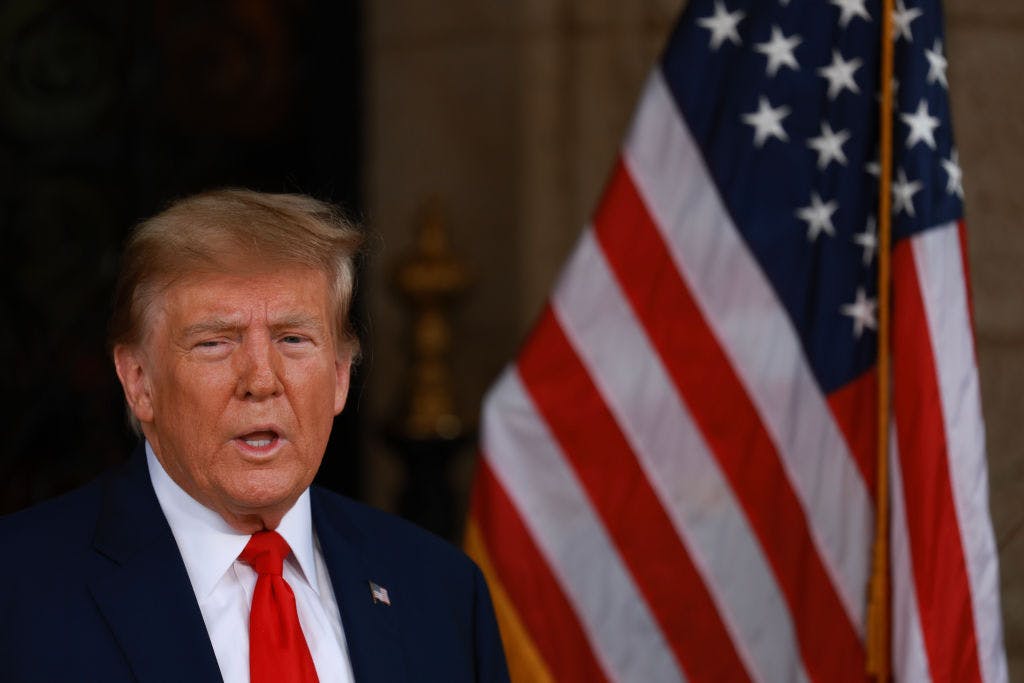Justice Alito, Mulling Trump Disqualification, Asks If Biden, by Treating With Iran, Could Be Found To Have ‘Given Aid or Comfort’ to Our Enemies
The bombshell question, a thinly cloaked hypothetical, came as the Supreme Court, including its liberal wing, appears skeptical of efforts to exclude Trump from the ballot as an insurrectionist.

One of the moments when it appeared likely that the Supreme Court is going to overturn Colorado’s ballot disqualification of President Trump came when Justice Samuel Alito asked the Iran question.
Could a hypothetical president, the justice wondered, say, President Biden, be accused of having “given aid or comfort to the enemies” of America, say, Iran, if he released money to their coffers? That language is from the same constitutional clause, Section Three of the 14th Amendment, as is now being cited to bar Mr. Trump from the ballot as an insurrectionist.
The Supreme Court’s weighing of that question — whether President Trump can be disqualified from holding office — sets the stage for a high-stakes ruling that could reshape the 2024 presidential race. The justices, though, seem inclined to harbor few doubts that Mr. Trump is constitutionally qualified to run for a second term.
One legal sage who filed a brief in this case, against disqualification, Joshua Blackman, tells the Sun that his impression is that Mr. Trump “will win big league.”
Over more than an hour and a half, attorneys for Mr. Trump on the one hand and the group of Colorado voters on the other debated Civil War history, constitutional precedent, and the nature of what transpired on January 6, 2021. At stake is the meaning of the Constitution’s ban on holding office by those who swore an oath to the Constitution and then “engaged in insurrection or rebellion.”
A lawsuit brought by Citizens for Responsibility and Ethics in Washington seeking to bar Mr. Trump from the ballot in Colorado failed at the district court, where the presiding judge, Sarah Wallace, held that the president is not an “officer of the United States,” as the amendment requires. The Colorado supreme court, though, by a 4-to-3 margin, found that the president is an “officer of the United States” and that Mr. Trump engaged in insurrection.
The high court appears similarly fractured. CREW’s attorney, Jason Murray, championed the ability of states to “safeguard their ballots” by barring Mr. Trump from the ballot. He argues that Mr. Trump’s position that only Congress can disqualify a candidate would “rip the heart out of Section 3.”
Even such a liberal stalwart as Justice Elena Kagan appeared to fear the implications of allowing Colorado to disqualify Mr. Trump. She asked: “Why should a single state have the ability to make this determination, not only for their own citizens, but for the rest of the nation?” Another liberal, Justice Sonia Sotomayor, ventured that disqualification of a president would appear to be a “national question.”
Chief Justice Roberts zoomed out to 30,000 feet, asking if the “whole point of the 14th Amendment was to restrict state power,” then why was Colorado, in arguing that it could, taking “a position that is at war with the whole thrust of the 14th Amendment?” He added that the clause would be “the last place you’d look for authorization for the states, including Confederate states, to enforce the presidential election process.”
Mr. Murray struck a defiant note, declaring that “President Trump engaged in insurrection against the Constitution” and that “we haven’t seen anything like January 6 since the Civil War.” The court’s senior justice, Clarence Thomas, observed that at the time of Section Three’s passage, there was a “plethora of Confederates,” and there is no record of any national candidates — let alone a presidential one — being disqualified from office.
The chief justice pushed Mr. Murray whether, according to his logic, Mr. Trump was “disqualified from the moment” he allegedly committed the insurrection. What of his acts in office, then, between January 6 and January 20? This inquiry cuts to the quick of whether Section Three is self-executing. If it is, it can click into effect without the passage of a law explicitly activating its provisions.
Several of the justices appeared worried about the downstream consequences of barring Mr. Trump from the ballot. Justice Alito wondered whether members of the military could disobey orders from a commander in chief the instant he is found to have engaged in insurrection. Chief Justice Roberts noted that a “goodly number of states will say: ‘Whoever the Democratic candidate is, you’re off the ballot.’” He called that a “pretty daunting consequence.”
Even the court’s newest justice, Ketanji Brown Jackson, who has stamped herself as a liberal lion, questioned the logic of patchwork disqualification for national office. She wondered why the “Framers would have designed a system that would — could — result in interim disuniformity in this way?”

